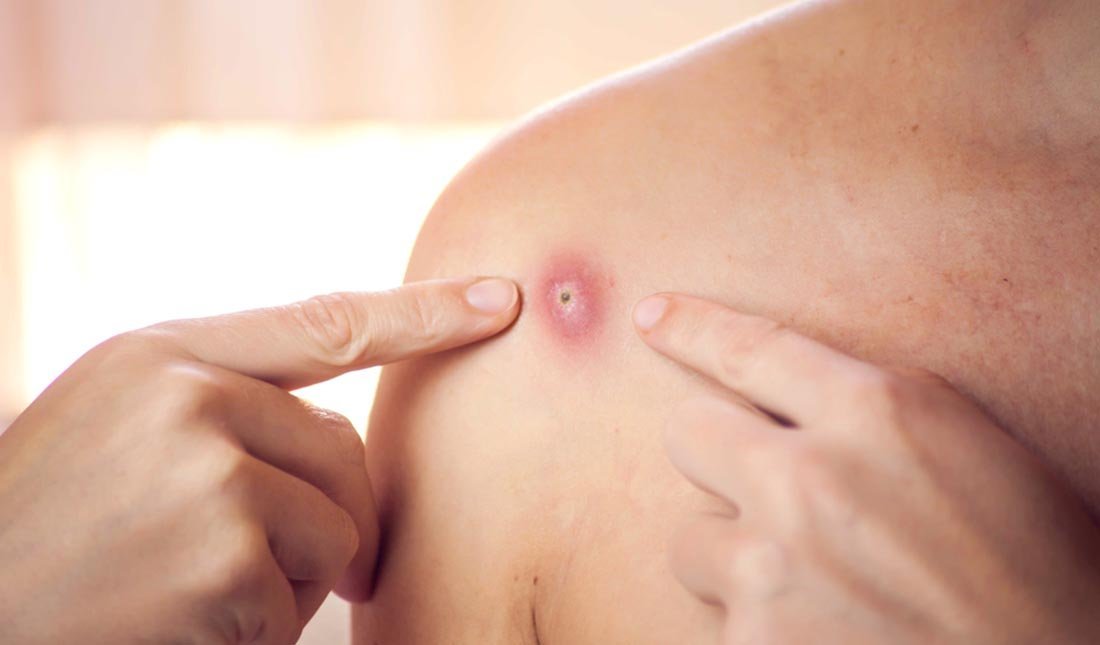A boil is a puss-filled bump formed under the skin. It is very painful and occurs due to bacterial infection or inflammation around one or more hair follicles on the skin.
Home Remedies For Boil In The Private Area
A cluster of boil forming a connected area under the skin is known as a carbuncle. The beginning of boil on the skin is marked with the formation of red bumps that are tender and stats accumulating pus. As the pus accumulation continues, they grow larger and become more and more painful.

The boils continue to grow until the skin ruptures and the pus is drained out.
What causes boils?
Boils are caused by Staphylococcus aureus infection. This is a kind of bacteria predominantly found on the surface of the skin outside the nose.
Boils occur if the skin is broken due to some insect bite or injury, which provides access for the bacteria to enter the inner layer of the skin and cause infection.
Some risk factors associated with boils:
Anybody can develop boils. However, there are certain factors that increase the probability of getting a bacterial infection.
These risk factors include close association with a person having the staphylococcus infection like having boils or carbuncle.
Diabetes compromises the immune system of the body hence an individual becomes more susceptible to bacterial infection.
Certain skin diseases like acne or eczema can impair the protective capability of the skin, this increases the chance of bacterial entry into the skin to cause infection.
Individuals with a weak immune system because of any underlying condition are vulnerable to a large variety of infections including bacterial infections causing boils.
Boils in the private pats can often be caused by sexually transmitted infections or piercings in the private areas.
Home remedies for treating boils of the private area.
There are a large number of home remedies that prove to be effective against boils in the private parts.
Applying warm compression can ease out the discomfort. A soft washcloth soaked in warm water should be placed on the boil for 10-15 minutes. This may release some of the pus and provide comfort. However, caution should be maintained not to squeeze the boil.
Sitz bath can be used to treat boils at home. Sitz baths are available for purchase online or in any medical store.
The plastic ring can be filled with warm water and placed on top of a toilet seat or an alternative is to sit in a warm water bath.
The private area should be kept clean and dry. It should be washed regularly with antibacterial soap, the foam should be rinsed off with a spray bottle and dried with a soft cloth.
Rubbing or touching the boil should be avoided and hands should be washed with soap and water prior to applying any tropical medicine to the area.
Tight undergarments should be strictly avoided, as they can rub against the boil and cause more irritation and inflammation.
Clean cotton underwear that is a bit loose is an ideal choice as it allows the skin to breathe and keeps the private area dry.
In case of painful boils taking over-the-counter pain relievers can help in managing the condition. Acetaminophen and ibuprofen are some good options that can alleviate the pain.
However, if these medications fail to control the pain, one should consult a doctor without delay.
Home remedies to avoid:
Not all home remedies help in getting rid of boils, there are certain mistakes that should be avoided to prevent further complications to the infection.
A boil should never be pricked or squeezed. If pus starts draining out, a clean, soft bandage should be placed on it.
Using any form of a highly fragranced ointment, baby wipes, or lotions should be avoided by all means. They contain harmful chemicals that can cause more irritation at the infection site.
Personal items like towels, athletic gear, sheets, and razors should not be shared as this can cause transmission of the staphylococcus bacteria from one person to another.
If an individual has any sore or cut on the skin, linens and towels should e washed properly with detergent and dried in a hot drier before use to prevent the entry of Staphylococcus bacteria into the skin.
What if home remedies fail?
Medical attention should be sought if the boil does not respond to the home treatments or the medication does not relieve the pain.
Signs like the presence of blood in the leaked pus, hotness in the skin surrounding the boil, or systemic infection that is marked by the onset of fever also require urgent medical attention from a qualified physician.